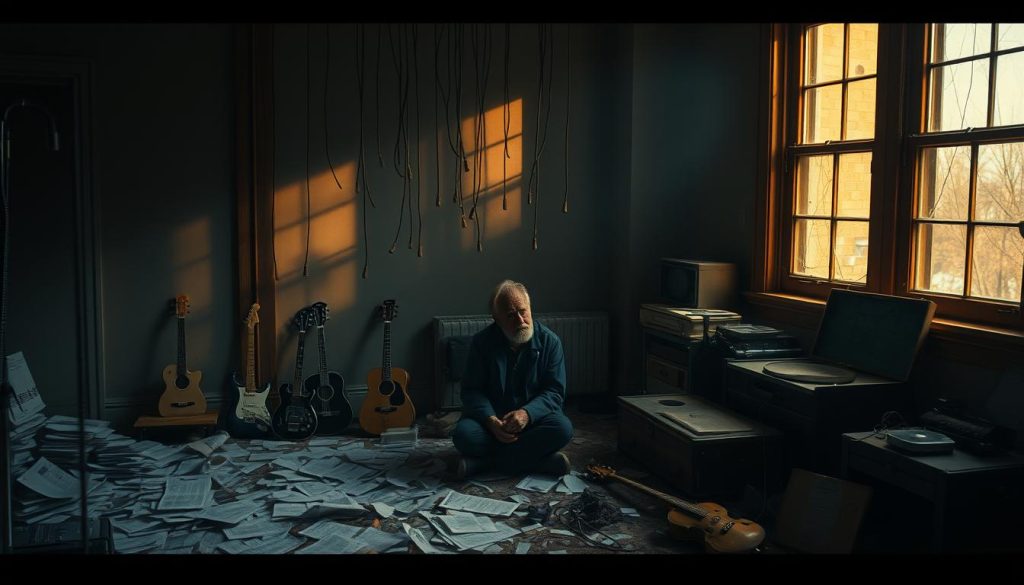In the music industry, a disturbing trend has appeared. Independent artists, the heart of creativity and innovation, are being exploited and seen as the “new whores” of the business1. This exploitative system, based on a capitalist patriarchy, has long plagued the industry. It perpetuates unfair contracts, diminishes creative rights, and creates a huge power imbalance.
Indie artists, driven by passion for their craft and a desire for independence, find themselves in a predatory environment2. Major labels hold a tight grip, trapping these artists in unfair contracts. These contracts take away their creative freedom and fair royalties, leaving them vulnerable to the industry’s exploitative nature.
Key Takeaways
- The music industry is a capitalist patriarchy that exploits independent artists
- Indie artists face unfair contracts that diminish their creative rights and royalty payments
- Major labels perpetuate predatory practices, capitalizing on the struggles of independent musicians
- Transparency and empowerment are crucial to addressing the harsh realities indie artists face
- The exploitation of indie artists has become so entrenched that they are likened to “new whores” of the industry
The Pervasive Exploitation of Indie Artists
The music industry is seen as a “capitalist patriarchy” where indie artists face exploitation3. They often sign contracts that favor major labels, reducing their creative rights and control3. These unfair deals give labels too much power, making it hard for artists to keep their vision and autonomy3.
Unfair Contracts and Diminished Creative Rights
Starting artists are often locked into long-term contracts with little pay3. Some are stuck in deals they can’t get out of, as labels control their work for production and promotion34. This power struggle has led to debates over who owns an artist’s work, with stars like the Beatles and Taylor Swift speaking out4.
| Contractual Issues Faced by Indie Artists | Examples |
|---|---|
| Unconscionable contracts | Contracts that “never” end, mortgaging an artist’s future |
| Not releasing or promoting work | Issues related to age, race, gender, identity, mental health |
| 360 deals that take advantage of artists | Britney Spears’ conservatorship case |
Artists are fighting back with statutory help, self-help, and negotiation skills3. They recommend keeping copyrights, licensing, and making contracts shorter3.
The exploitation of indie artists is a big problem in the music world34. It’s important to protect the rights and freedom of indie artists34.
The Struggle for Fair Royalty Payments
With the music world moving more towards streaming, indie artists find it hard to get fair royalty payments. They pour their hearts into their music but often can’t make a living from it. This is because the money from streaming income is not shared fairly. They must then look for other ways to make money or change their music to please the industry5.
Many independent artists don’t get the royalties they should because they’re not registered5. Signed artists also give up a lot of their rights to labels and publishers. This means they make even less money5.
In the UK, some artists think the current royalty rates for streaming are too low6. A new plan, called equitable remuneration (ER), aims to fix this. It would make streaming services pay more to artists and labels, just like radio does in the UK6.
The music world is still figuring out how to solve these big problems. But independent artists keep fighting for the fair royalty payments they deserve. As things change, finding a fair solution is key to a better music industry for everyone56.
indie artists exploitation: The Harsh Reality
The harsh reality of indie artists exploitation is deeply rooted in the music industry. Independent musicians face a system that values profits over their art. This leads to a constant struggle to keep their creative work and earn a fair income. Indie artists are now seen as “new whores” of the industry, forced to give up their values and freedom to survive7.
Exploitation often comes in the form of unfair contracts, less creative control, and low royalty payments. Record companies make artists sign away their rights for a chance to perform and make money. This leaves artists at the mercy of the industry’s power7.
Fighting for fair pay is a never-ending battle for indie artists. Legal fights over royalties and rights usually favor record companies. This power imbalance has led some artists to start their own labels to keep control, even if it means less profit7.
Indie artists also face many other exploitative practices. These include pay-to-play schemes, false promises of fame, and misleading feedback services. These tactics prey on artists’ dreams of success, leading to financial and creative losses8.
To fight back, independent musicians need knowledge and determination. Knowing the industry’s pitfalls and legal protections can help artists negotiate better deals and protect their rights7. Persistence and awareness from all artists can help change the industry’s exploitative ways7.
“Independent musicians should aim to remove middlemen to ensure that their art reaches the right audience without exploitation.” – ASHWYN, Berklee College of Music Student9
The harsh realities of indie artists exploitation highlight the need for change in the music industry. Empowering artists, being transparent, and embracing new models and technologies can lead to a future of true creative freedom and fair pay9.
The Role of Major Labels in Perpetuating Exploitation
Major record labels dominate the music industry, leading to exploitation of indie artists10. They control key areas like booking shows and music distribution. This gives them power to take advantage of independent musicians10. Even with the internet changing how music is shared, major labels still hold a lot of sway. They often block indie artists from achieving their creative dreams10.
Major label contracts often have unfair terms that hurt indie artists’ freedom and finances. Famous bands like Radiohead and Nine Inch Nails left major labels to keep their creative control10. On the other hand, artists like Lupe Fiasco have seen their music change after signing with major labels. This shows how the industry can limit artistic freedom10.
Predatory Practices and Power Imbalances
The music industry is built on capitalism and patriarchy, leading to exploitation of indie artists. Major labels focus more on making money and appealing to certain groups than on the art itself10. Companies like Cash Money are criticized for promoting a lifestyle over music10. This focus on commercial success over artistic growth is seen as harmful10.
Independent artists and labels are fighting back, promoting diversity and giving artists more say11. Underground hip-hop artists like Immortal Technique and P.O.S. use their music to push for change. They stand in contrast to the mainstream rap industry’s potential harm to young listeners10.
The music industry needs to change to address the power imbalances and predatory practices of major labels12. By empowering indie artists and adopting fairer models, the industry can truly make a positive impact12.
Empowering Indie Artists: A Call for Change
The music industry faces a big problem with indie artists exploitation. We need to empower independent musicians and make the business more open. This is key to fixing the issues that let exploitation happen13. We must push for changes that protect artists’ rights and let them control their work. This will make the industry fairer and better for everyone, not just big labels.
Helping indie artists get fair pay for their music is important. The current system is too complex and unfair, leaving artists with too little money14. Making payment systems clear and simple can help rebuild trust and fairness.
- Encourage artist-friendly contracts that give more control and fair profits.
- Support artists working together to speak louder and get better deals.
- Help create new ways for artists to share their music and have more freedom.
Supporting these changes can make the industry better for everyone13. It will help independent artists and make music better for fans and the industry too.
“Music has the power to inspire people emotionally and rally them behind causes for social change.” – John Lennon
We all have a role to play in making the music industry fairer and more sustainable. Artists, industry folks, and fans must work together. Together, we can help a new generation of indie artists succeed and shape our culture for years to come.
The Future of Music: Transparency and Artist Empowerment
The music industry is changing fast, bringing hope for more openness and power for indie artists. New ways and tools are coming to fight the unfair treatment indie musicians face. This could make the industry fairer and more stable for everyone.
Embracing New Models and Technologies
The Protect Working Musicians Act is a big step forward for indie artists15. It wants to let indie creators talk together with big music platforms and AI companies. This way, they can get fair pay and know how their work is used16.
Collective bargaining could help indie artists get better deals. This could make the music world more successful and happy for everyone.
Streaming has changed the music world a lot15. Now, people spend $120 a year on streaming, up from $64 in 199915. The industry saw a 39% jump in streaming money in 201415. With over 41 million people paying for streaming, artists need fair pay more than ever.
| Metric | Value |
|---|---|
| Annual music spending per consumer (1999) | $64 |
| Annual streaming subscription cost (current) | $120 |
| Streaming revenue growth (2014) | 39% |
| Paid streaming subscribers (major markets) | 41 million+ |
New tech, like AI music, is shaking things up. The Protect Working Musicians Act tries to help indie artists deal with these changes. It wants to make sure they can work with AI companies and keep control over their music16.
By using these new ideas and tools, the music world can become more open and fair. This change will help indie artists and make the music scene stronger and more lively.
Conclusion
The issue of indie artists exploitation in the music industry is urgent. It involves unfair contracts and struggles for fair pay. Independent musicians face a tough reality due to the industry’s capitalist and patriarchal nature17.
Major labels are key in keeping these music industry abuse practices alive. They use their power to take advantage of indie artists17.
A change is needed to empower artists and increase music business transparency. New models and technologies can create a fairer music world17. It’s time to free indie artists from exploitation and help them succeed in their art and finances18.
Supporting indie artists means understanding their stories and valuing their vulnerability and strength18. Being open-minded and non-judgmental is key to appreciating their unique music18.
FAQ
What are the key challenges faced by independent artists in the music industry?
How do unfair contracts impact independent artists?
What challenges do indie artists face when it comes to earning fair royalty payments?
How has the exploitation of indie artists become entrenched in the music industry?
What role do major record labels play in perpetuating the exploitation of indie artists?
How can the music industry address the systemic exploitation of indie artists?
What opportunities exist for the future of the music industry to empower indie artists?
Source Links
- Miley Cyrus: does the music business exploit women? | The panel
- FEATURE: Sexual Expression and Exploitation in the Music Industry — Music Musings & Such
- Selling Out for a Song: “Artist Abuse” and Saving Creatives from Servitude and Economic Disadvantage in the Entertainment Industry
- Microsoft Word – WINDER_Thesis_TensionInTheIndustry-AnAnalysisOfTheConflictBetweenRecordingArtistsAndRecordLabelsOverTheRightsToMusicOwnership_2020.docx
- Music Royalties Explained: The Ultimate Guide for 2024
- The Fight Over Music-Streaming Royalties Misses the Point
- The Illusion of Fame — The Music Industry’s Dark Secrets
- 6 Typical Music Industry Scams Targeting Indie Artists
- Disillusioned By The Numbers Game? A Young Indie Artist Who Has Received Support From International Heavyweights Like Hardwell and Tiësto Has A Message For You
- Commentary: Record companies are out of tune with society
- Journal of the Music & Entertainment Industry Educators Association
- Concentration, diversity, and consequences: Privileging independent over major record labels | Popular Music | Cambridge Core
- The Intersection of Indie Music and Activism: Music Platform for Social Change
- A music industry for the 99%
- Proposed US bill would allow indie artists to negotiate collectively with streaming services, AI companies – Music Business Worldwide
- The Exploited Artist vs. the Insecure Artist
- The Biggest Problem For Small and Indie Musicians



